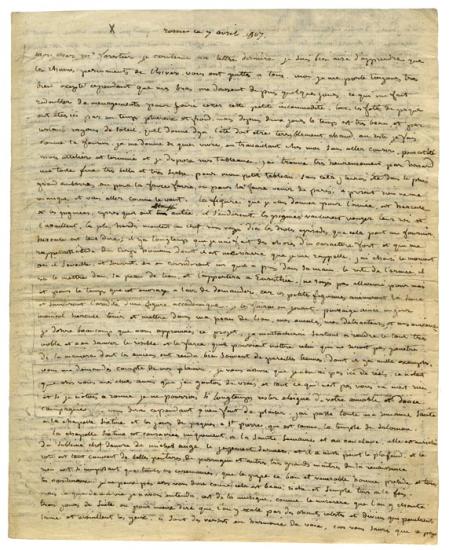
Jean-Auguste-Dominique Ingres, Letter from Ingres to Charles-Pierre-Michel Forestier, 7 April 1807, page 1, MA 2701.
Purchased on the Fellows Capital Fund, 1969
Sent to his prospective father-in-law six months after arriving in Rome, this letter indicates that the artist's spirits had improved. Ingres was decidedly entranced by the many masterpieces on public view, such as Michelangelo's Sistine Chapel and "the beautiful paintings of Perugino." He also includes news about recent developments at the French Academy in Rome, notably the sudden death of the director, Joseph Benoît Suveée (1743–1802). Ingres writes of the latter's replacement, Guillaume Lethière, of whom he would later create a masterful portrait: "I really like M. Lethière, and I hope that I will get along with him as well as I did with M. Suvée."
Rome, 7 April 1807, to Monsieur Forestier
My dear Mr. Forestier, I continue my last letter. I am glad to hear that the enduring head colds of winter have left all of you; I am very well, except that my arms have been twitching for several days, which makes me be twice as cautious in order to stop this little inconvenience. All the Easter celebrations have been held in rainy and cold weather, but for the last two days the weather is beautiful, and judging by some rays of the sun, the summer will be terribly hot. Anyway, I am like the ant, I earn my living by working at home without running about. My studio is finished for this summer and I am laying out my paintings. I happily found by chance a fine canvas, very beautiful and very dry, for my little painting, without which I would have been greatly troubled whether to have it made or to have it sent from Paris. Now, nothing is missing and I will move ahead like the wind. The subject that I will present this year is Hercules and the Pygmies. After he had strangled Antaeus, he fell asleep. The Pygmies wanted to avenge their king and attack him. The boldest climb the head. You can imagine the amusing episodes that this can provide me. Hercules, one need say no more. It's been a long time since I have done things of a strong character and that remind me of the study of the human body, which it is necessary that I remember. I chose the moment when he wakes up and smiles, looking at a Pygmy that he holds in his hand. He will put the rest of the army in the lion's skin and bring it to Eurystheus. Do not be alarmed for me and for the time that this work seems to require, because these small figures will animate the scene and temper the aridity of an academic study. I'll paint them playfully. May I one day, a new Hercules, hold and put in my lion skin my rivals, my critics and the envious. I hope very much that you approve of this project, I will commit myself especially to making the work feel noble and to set aside the ludicrous and the farcical elements that might be put in by someone not imbued in how ancient artists treated such scenes, of which there are a thousand examples. You ask for an account of my pleasures, I assure you I have no real ones here. It was only at your home, my dear friends, that I tasted real ones, and everything that is not you is nothing to me and were I not in Rome, I could not stay away so long from your gracious and kind company. I will tell you however in regard to pleasures that I have spent Holy Week in the Sistine Chapel and the Easter holidays in St. Peter, which is like the temple of Solomon. The Sistine Chapel is dedicated solely to the Holy Week and to the conclave. It is enriched by the sublime masterpiece of Michelangelo, The Last Judgment, and he also painted the ceiling, and the rest is covered with beautiful paintings by Perugino and other great masters of the Renaissance. Nothing is more impressive than all these ceremonies, than the Pope, this good and venerable man presiding, and all the cardinals. I cannot tell you enough how it is beautiful, rich and simple all at once, but what I had never heard in my life was music like the Miserere, which is sung on three consecutive days, or, rather, that is exhaled in celestial and divine songs that penetrate the soul and moisten the eyes. These are verses sung in a harmony of voices, for bear in mind that the Pope
